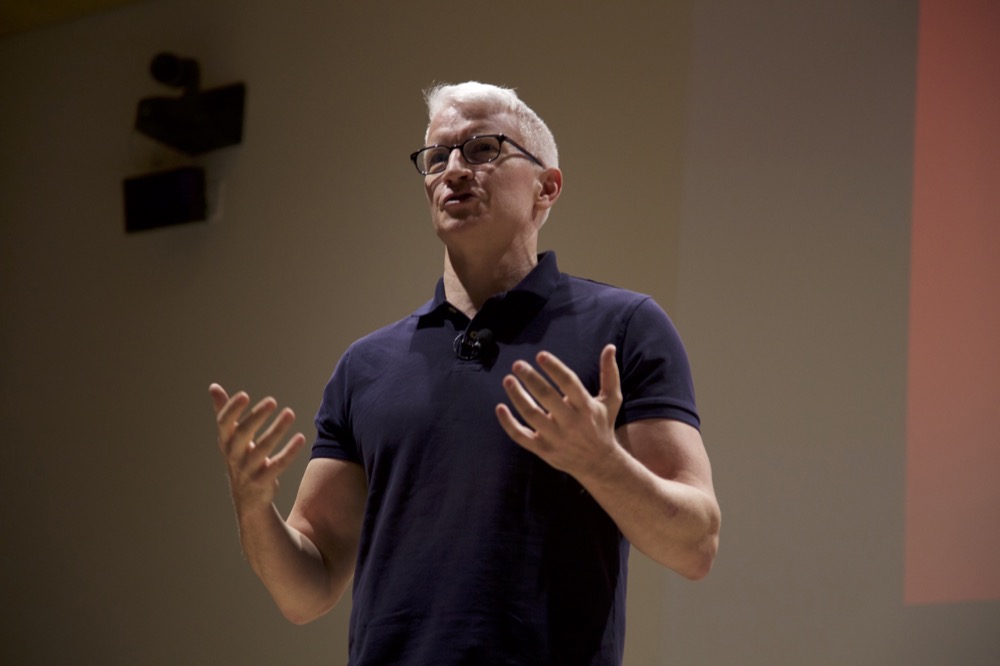Campus Events | News
Anderson Cooper delivers Founder’s Day student address
CNN news anchor Anderson Cooper spoke about his entry into journalism and his advice for students as the keynote speaker at the Founder’s Day student address, an event hosted by the Washington University Alumni Association Saturday Oct. 28 at 3 p.m. in Knight Hall.
The student address was open to all Washington University students, but due to limited seating, tickets were distributed with the first-come-first-serve policy with doors opening at 2:30 p.m. The event began with brief opening remarks from Chancellor Mark Wrighton and Steven Segal, the chair of the Alumni Board of Governors. Segal then introduced Cooper.
 Jiyoon Kang | Student Life
Jiyoon Kang | Student Life CNN’s Anderson Cooper speaks at Knight Hall on Oct. 28. Cooper was chosen to deliver the keynote address as part of Founder’s Day this weekend.
Cooper gave a short introduction regarding how he ended up with his position at CNN. In college, Cooper majored in political science but was unsure about what career he would pursue. It was in his senior year that he realized his interest in foreign war correspondence.
He then applied to various entry-level jobs at major news agencies but did not receive any job offers, so he worked as a fact-checker at “Channel One,” a news program aimed towards youth, before quitting to pursue his dream job travelling around the world for three years, reporting on wars and conflicts in Rwanda, Israel, Sarajevo and other countries.
These reports eventually led to a job offer for a position as an ABC correspondent. Cooper believes that if he had originally been hired at one of the entry-level jobs he applied to, he never would have been offered that job—the one that eventually propelled him to other projects such as reporting for “60 Minutes” and hosting his own news show on CNN.
After his keynote address, Cooper opened the floor to questions from the students.
Questions ranged from a typical day on his CNN news program “Anderson Cooper 360” to his most interesting interview. According to Cooper, his best interviews came out of the more natural, conversationalist questions.
“A good interview should be a conversation,” Cooper said. “Anything that you have pre-written is going to be less interesting than what’s just come out of the interview.”
The question and answer format of the event allowed students more authentic access to Cooper, according to junior Natasha Suterwala.
“I really enjoyed it; I like that he made it a lot of a question and answer session,” Suterwala said. “That was not what I expected; I thought he was going to be speaking more, but I think it made it more enjoyable and made it a way for students to get his actual opinion on things that were important to them, and I really liked that format.”
During the speech, Cooper also addressed the recent public concern of “fake news,” pointing out that many news sources, especially online, will promote headlines that don’t match the information—or even make up their own information—just to get more views. According to Cooper, CNN works hard to check all its sources and release factual reports.
“My job is [to] challenge people on facts and [discover] what’s true and what’s not true,” Cooper said. “The greatest advantage I have as an interviewer is having the facts.”
His comments on “fake news” also brought up questions about his dealings with the Trump administration.
“Administrations don’t like to be criticized, but it’s our job to criticize,” Cooper said.
Cooper’s speech also touched on some optimistic notes, according to junior Pilar Gonzalez.
“I really liked his speech because I thought it was going to be something more pessimistic but it ended up being, ‘Yes, I know it seems that there is bad stuff going on in the world, but I can see so much good stuff happening too, and the only reason why we think that there’s more bad stuff is because we can see it through the media and news. But the world’s a better place than ever before,’” Gonzalez said.
For the students in attendance, Cooper’s keynote address was worth the wait in line.
“I really liked it, I actually lined up around 12 [p.m.], and I thought that was going to be early enough, but there was already a decent line,” Suterwala said. “I really like him and I really value his contribution to the news space; I think it’s unique in a lot of ways.”
Nonetheless, Suterwala felt that parts of Cooper’s speech may not have been applicable to all students.
“One thing about him telling his backstory about getting into news is that…it wasn’t really impactful because what he kind of said was ‘Put yourself out there, follow your dreams,’ which makes a lot of sense, but it’s important to understand that he comes from one of the richest families in the world, so that advice might not be applicable to every student here,” she said. “But I think that the advice that he gave during his question and answer session was very impactful and very helpful in many ways, in terms of journalism, and in terms of ways that you should look at the media and ways that you should hold yourself to certain standards of integrity.”
